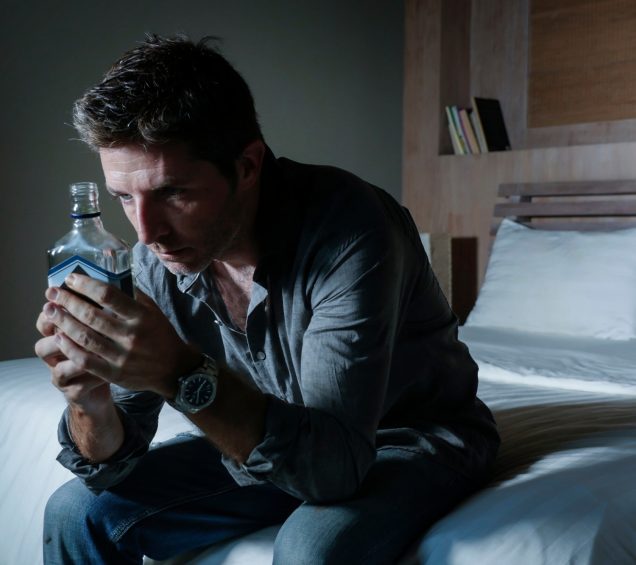Alcohol Use Disorder Signs & Symptoms
Often called alcoholism, alcohol use disorder (AUD) is a chronic, and very treatable, disease.
Alcohol use disorder (AUD) is a chronic, and very treatable, disease.
Alcohol Use Disorder Signs & Symptoms
Symptoms and indications of alcohol abuse include:
- Family history of alcohol use disorder (also called alcoholism)
- Frequent intoxication
- Drinking before noon
- Underage drinking and/or binge drinking
- A decline in self-care or hygiene
- Physical harm as a result of drinking (accidents or fights)
- Drinking alone
- The ability to consume a good deal of alcohol without getting intoxicated
- A preoccupation with drinking alcohol and/or cravings
- Suffering from blackouts or memory lapses while drinking
- Using alcohol to alter one’s mood
- Binge drinking (periodic, extreme overindulgence) - consuming five or more standard drinks (male), or four or more drinks (female) in one occasion.
- Hiding alcohol or sneaking drinks
- Drinking prior to events or social gatherings where alcohol will be served
- Job loss or complaints by employers regarding one’s drinking
- Relationship or marital problems as a result of too much drinking
- Complaints from friends, relatives, or co-workers about problem drinking incidents
- Alcohol related arrests: public intoxication, DUI, lewd behavior, altercations
- Behavioral changes while intoxicated: anger, sexual promiscuity, rash acts
- Feeling remorseful or humiliated by drinking-related behavior
- Social rejection or loss of friendship as a result of one’s drinking
- Neglect of other activities
- Drinking and driving or drinking in dangerous situations
- Changes to personality
Identifying Addiction: Know the Signs of Alcohol Use Disorder
While the above indicators are signs of alcohol abuse, a diagnosis of alcohol use disorder necessitates physical dependence on alcohol. The most common physical signs of alcohol addiction are:
- Increased alcohol tolerance: more and more alcohol is needed to feel its effects
- Inability to quit drinking despite many attempts and desire to stop
- Loss of control (one cannot control the amount of alcohol he consumes at any given time)
- Alcohol consumption or other drugs are required to avoid withdrawal symptoms: nausea, shakiness, anxiety, sweating, and, with more severe cases, seizures, delirium (or hallucinations)
- Craving for alcohol that can contribute to relapse if one attempts to abstain
Side Effects of Alcohol Use Disorder
Alcohol Use Disorder (AUD) can lead to a wide range of physical, social, and mental health problems. These effects can vary in severity depending on the extent of alcohol misuse. Here's a list of potential side effects associated with AUD:
Physical Side Effects:
1. Liver Damage: Cirrhosis, fatty liver, hepatitis, and other liver diseases due to excessive alcohol consumption.
2. Heart Problems: Increased risk of hypertension, irregular heartbeats, cardiomyopathy, and increased risk of heart disease.
3. Gastrointestinal Issues: Gastritis, ulcers, pancreatitis, and increased risk of gastrointestinal bleeding.
4. Neurological Impairment: Memory problems, cognitive deficits, and neuropathy due to alcohol's impact on the nervous system.
5. Immune System Suppression: Weakened immune response, making the body more susceptible to infections.
6. Cancer Risk: Increased risk of various cancers including mouth, throat, liver, breast, and colon cancers.
7. Nutritional Deficiencies: Malnutrition due to poor dietary choices and impaired nutrient absorption.
8. Endocrine Disruption: Hormonal imbalances, including disrupted reproductive hormones and increased risk of sexual dysfunction.
9. Risk of Injury: Impaired coordination and judgment leading to accidents, falls, and injuries.
10. Withdrawal Symptoms: Tremors, sweating, anxiety, nausea, and seizures when alcohol consumption is abruptly reduced or stopped.
Mental and Emotional Side Effects:
1. Depression: Increased risk of developing or exacerbating depressive symptoms.
2. Anxiety: Heightened anxiety and panic attacks, especially during withdrawal.
3. Cognitive Impairment: Memory lapses, impaired decision-making, and reduced concentration.
4. Mood Swings: Frequent and severe mood swings, irritability, and emotional instability.
5. Sleep Disorders: Insomnia and disrupted sleep patterns due to alcohol's impact on sleep architecture.
6. Psychosis: Delusions, hallucinations, and impaired perception of reality, especially during severe withdrawal.
Social and Behavioral Side Effects:
1. Relationship Strain: Marital problems, and conflicts with family and friends due to erratic behavior, and neglect.
2. Social Isolation: Withdrawal from social activities and isolation from loved ones.
3. Legal Issues: DUI charges, accidents, and legal consequences related to alcohol-related behaviors.
4. Financial Problems: Excessive spending on alcohol, job loss, and financial instability.
5. Reduced Occupational Functioning: Impaired work performance, absenteeism, and decreased productivity.
6. Risky Behaviors: Engaging in risky sexual behavior, impaired driving, and other dangerous activities.
7. Loss of Interest: Decreased interest in hobbies, activities, and passions.
If You or Someone You Know is Suffering from or at Risk of Substance Use Disorder Caron is Here to Help
Continue Learning About Alcoholism Symptoms
Take the next step:
Start with an online form
-
Caron in Pennsylvania
1-800-854-6023 -
Caron in Florida
1-800-221-6500 -
Breakthrough at Caron
1-800-213-7834



